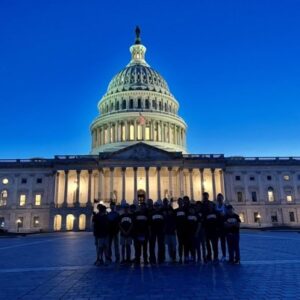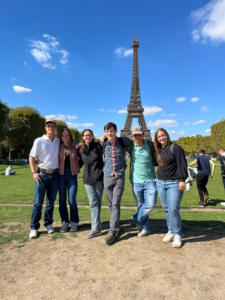January 4, 2023
Regents Daily News: January 4, 2023
What Education Is, What It Isn’t, and Why It Matters
In More Than Dates & Dead People: Recovering a Christian View of History, a wonderful little book our students read in 7th grade, Stephen Mansfield defines religion as “ultimate concern.” He explains that if you can put your finger on a people’s ultimate concern, what is most important to them, you have identified their religion. He goes on to define other important terms in light of this:
- Culture is religion externalized
- Art is religion symbolized
- Law is religion codified
- Education is religion transferred
Education, then, can be thought of as our ultimate concerns handed on to the next generation. Similarly, GK Chesterton defined education in this way: “Education is not a subject, and it does not deal in subjects. It is instead a transfer of a way of life.” Thinking of education in this way differs greatly from a more modern view of education that focuses on job skills and test scores.

That education is much more than data transfer and information download has always been at the heart of classical Christian education. Regents Academy isn’t a factory, and our students are not just numbers in seats or faces in a crowd. Instead, they are eternal souls made in the image of God who live in His created world and have purpose and meaning. From these basic facts stems our mission statement:
Regents Academy exists to serve families by providing a distinctly classical and decidedly Christian education that equips students to lead lives of virtue, display mature character, love learning, and serve the Triune God.
This mission statement deliberately points to virtue, maturity, and character as the aims of education, rather than merely academic achievement or career-based skills. And if education is the transfer of a way of life to the next generation, then virtue, maturity, and character are of far more importance to cultural preservation than mere information download. In fact, it means the field of education is one of the most important, front-line battle fields in our day.
I pondered all of this during a couple of recent field trips, first, with our 6th grade class to Washington DC, and second, with our senior class to London and Paris. I had never been to DC nor overseas, and while I expected it to be an enjoyable time, I did not anticipate how much it would stir in me a sense of wonder, gratitude, and perspective. During these trips, I witnessed various representations of our heritage, our story, something we’ve been given. I stood over some of our founding documents. I visited Arlington National Cemetery and various war memorials honoring the lives of those who’ve fought and died to secure the freedoms and liberties that our nation has enjoyed. I walked through cathedrals, viewed the Magna Carta, and stood in places where our ancestors once stood hundreds of years before. Some of them fought against tyranny, others preached the gospel, and some helped establish a structure of government outlining God-given rights, freedoms, and limits of power.

But our heritage seems to be in jeopardy. While we live in a time and place with more freedoms, opportunities, and comforts than just about anyone else in all of history has ever known, at the same time we are witnessing a squandering of that inheritance. We live in a day where many rights, freedoms, and Christian cultural norms have faded or even disappeared right before our eyes. Is it simply inevitable that these trends will continue until we completely forget where we’ve come from and from whom all our blessings have come? Or is it possible to turn things around, to reclaimcultural ground, and to preserve freedom and liberty? I’d like to suggest that Regents Academy’s mission offers us an opportunity to play a crucial role in the preservation and cultivation of Christian culture in our day. We can preserve freedoms and liberties and reclaim Christian cultural ground if there are men and women who want to preserve those things and who are also equipped to do so.
 So how can an education at Regents Academy equip students to make such a cultural impact? Our goal all along has not been to simply provide an alternative educational option or to simply offer a drug-free, gang-free environment where boys must use one restroom and girls use another. We’re in favor of those things, of course, but they are by-products of a much bigger and broader mission, one that seeks to inculcate biblical virtue, maturity, sound reason and faith, and a love for and a desire to serve others. A generation equipped with such tools can have a tremendous and godly impact on our culture.
So how can an education at Regents Academy equip students to make such a cultural impact? Our goal all along has not been to simply provide an alternative educational option or to simply offer a drug-free, gang-free environment where boys must use one restroom and girls use another. We’re in favor of those things, of course, but they are by-products of a much bigger and broader mission, one that seeks to inculcate biblical virtue, maturity, sound reason and faith, and a love for and a desire to serve others. A generation equipped with such tools can have a tremendous and godly impact on our culture.
Someone might argue that a private education like what Regents offers is all well and good for the really bright over-achievers who will go on to study at big name colleges or work in important fields (like politics) where the real cultural battles are fought. But I’d like to suggest that the most important cultural battles to be fought are in the hearts and minds of our children, in our homes, and in our communities. And that’s why the aims of classical Christian education and the goals of Regents Academy are not simply about high achievement, college prep, rigor for the sake of rigor, information download, or data transfer. To be clear, students of classical Christian education have achieved quite a lot and tend to be much more prepared for college and jobs than their peers, but there is so much more to education than that.
This equipping of students at Regents Academy takes place each day as students wrestle with deep and difficult questions which civilizations have sought to answer for centuries. As our kindergarteners line up with “bubbles and ducktails,” they are learning what it means to love their neighbors as they walk down the hall. Transformation happens when students are armed with critical thinking skills to distinguish between sound reason and foolish arguments and as they stand in the hall and have a heart-to-heart talk with their teacher about their behavior in class. Students are equipped wit

h culture-transforming traits when they learn to sing and serve, play, fall down, and get back up, as they win championship games, and as they lose them.
Considering education as “religion transferred” or the “transfer of a way of life” makes the field of education one of the mostcritical issues for any generation. Shepherding hearts, training affections, and seeking objective, biblical truth, beauty, and goodness, is the only way to equip the next generation to reclaim and to advance our Christian heritage. By God’s grace, cultivating virtue, maturity, and faithfulness in our students can produce a truly educated people who appreciate the heritage they’ve been given, honor and respect those who’ve gone before them, and are prepared to faithfully labor in whatever part of God’s kingdom they find themselves.
Lance Vermillion
Grammar School Principal


